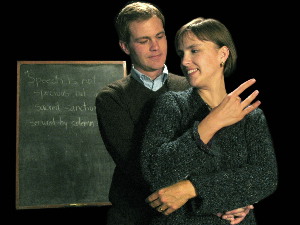‘Children of a Lesser God’ and ‘The Great Divorce’
Children of a Lesser God
Performed by Soulstice Theatre
at the Keith Tamsett Studio Theater, Marian Center
Written by Mark Medoff. Directed by Char Manny
Runs 130 min. w/ intermission, May 14-16
The Great Divorce
Performed by Acacia Theatre Co.
at the Todd Wehr Auditorium, Concordia University
Based on the book by C.S. Lewis, adapted by
George Drance, SJ and the Magis Theatre Company
Directed by Elaine Wyler
Runs 90 min. w/ no intermission, May 14-17
 There is – at least on some surface or technical level – a certain kinship of challenge between the two productions currently staging on two opposite sides of Milwaukee County this month. Both have entirely black stages, with many benches, stairs, or props painted black as well to give the idea that the play takes place in the mind of the main character. That protagonist remains on stage and speaking for most of the time. Both plays have religious or theological underpinnings, although one is more direct about it. One play has actors that had to study and perfect sign language as part of the role, while the other has actors who have decided to sporadically employ British or Irish accents. Finally, both plays contain characters who won’t give up vanities or singular points of view for the conflict to be resolved.
There is – at least on some surface or technical level – a certain kinship of challenge between the two productions currently staging on two opposite sides of Milwaukee County this month. Both have entirely black stages, with many benches, stairs, or props painted black as well to give the idea that the play takes place in the mind of the main character. That protagonist remains on stage and speaking for most of the time. Both plays have religious or theological underpinnings, although one is more direct about it. One play has actors that had to study and perfect sign language as part of the role, while the other has actors who have decided to sporadically employ British or Irish accents. Finally, both plays contain characters who won’t give up vanities or singular points of view for the conflict to be resolved.
But clearly this is where the kinship ends. Children of a Lesser God is a deep personal story about seven human characters interacting and making a life with each other on a very small stage in a 45-seat studio. The Great Divorce is a deep, near absurdist fantasy involving dozens of characters visiting hell and heaven staged in a large venue that could hold thousands.
 Children of a Lesser God is better known for the 1986 film starring William Hurt and Marlee Matlin than the original 1980 Olivier-award winning play, and so it is hard to remove all of the set pieces and movies star influence walking into this minimalist production. But soon Matthew Michaelis (James Leeds) and Jillian Smith (Sarah Norman) show some acting chops that make you forget prior influences and the outside world altogether.
Children of a Lesser God is better known for the 1986 film starring William Hurt and Marlee Matlin than the original 1980 Olivier-award winning play, and so it is hard to remove all of the set pieces and movies star influence walking into this minimalist production. But soon Matthew Michaelis (James Leeds) and Jillian Smith (Sarah Norman) show some acting chops that make you forget prior influences and the outside world altogether.
In the story, a speech therapist falls for a deaf former student turned maid at a school for the deaf. Leeds also faces off against a school administrator and jealous, longtime friend of Norman’s. When the first act ends with the pair married and Norman in the hearing world for the first time, it seems so much like ‘The End’ that people had to ask if it was intermission or over. Instead, the second act is filled with the act of love unraveling as the unwillingness to change or understand propels the action.
One of the extraordinary bits of the actors here was the training and heartfelt use of sign language which is so much at the heart of the story. The audience is occasionally denied the oral translation almost always provided by the stalwart teacher played by Michaelis, including a tender moment of comfort before the final storm. Smith is also saddled in her role using only her face and hands to express emotion.
While the supporting cast does a fine job, it’s the main juggling trick of what is said by Michaelis aloud and when Smith has made eye contact that is key. As an audience, we are led to believe that what she understands of his feelings and what he really feels are often different things.
It was a bit alarming at times to hear Michaelis swear up a storm in a venue that doesn’t take lightly taking the Lord’s name in vain, but not as alarming as a pivotal scene in which his character roars with anger rather than rasp with desperation – which makes him come off as a dominating male rather than a frustrated husband. Also, what is supposed to be a relationship between a 21-year old woman and older man with two actors nearly the same in age is something you’ll have to suspend disbelief over but isn’t too denigrating to the work. Sections regarding a sexual past for Smith and a mother issue for Leeds could have used a bit more emotion and pause, given that great passages of time are blurred over like a ‘chapter skip’ on a DVD. We are often supposed to believe that the building of trust and experience has happened between scenes.
But don’t let these minor points detract from what was a surprisingly rich drama with good actors. Soulstice Theater’s rendition is imaginative with its economy and thoughtful in its character development and procession.
There are many allegorical points to this play adapted almost verbatim and at length from C.S. Lewis’s lesser known but epic fantasy about what it would be like to take a bus ride from hell into the fields of heaven – or at least to some sort of green grass limbo stop – and watch as fellow passengers rail against giving up their beloved human weakness so they can go to the mountaintop (or heaven). Along the way, the audience is made aware of various vices and sniping that prevent us from being happy.
If there is one salient lesson from this troubling and difficult piece, it’s that adapting a piece with so many British ideas, lifestyles, terms, and accents can be a killer for a troupe that must also quickly rattle through lengthy diatribes and weighty discussions. There is so much to consider and absorb by the end of the 90 minutes that the Christian-based Acacia Theatre Company actors offers a talkback session at the end and ushers hand out leaflets describing the group’s take on the themes.
Scott Stewart does a fine job inhabiting a role that is essentially C.S. Lewis but really was the author’s perception of himself. His voice and attitude reminds you of the narrator of Douglas Adams’s Hitchhiker’s Guide to the Galaxy audiobooks – which is distracting so that I wondered what a stage production of the sci-fi/satire/lay philosophy series would be like. The two Britons shared many commonalities but would definitely have disagreed in the end.
It is hard to follow some of the action onstage here. There is hardly a pause between words or concepts, not as a matter of rat-a-tat patter but because of a stream of rambling consciousness that came from the source material. The set-ups to characters are amusing, as are the individual predilections that complicate a character’s entry into heaven. There are a few moments of true sadness recognizing the idea that an actual afterlife is a transcendent place that plays by different laws than we follow on an earthly plane.
The staging and logistics for Divorce are also admirable: the use of fog, lighting, glowing props are effective in casting a mood. Actors tasked with playing multiple roles manage to pull off even widely different characters. It’s just a different kind of theater reminiscent of Greek tragedy mixed with a Modernist play, which in a current local season that often presented lighthearted musicals or well-known traditional dramas leaves Divorce as an odd fellow out.
For ticketing information, contact Soulstice at 414.431.3187 or Acacia at 414.744.5995. For venue, tickets, showtimes and more, visit Footlights Milwaukee online.
Theater
-
‘The Treasurer’ a Darkly Funny Family Play
 Apr 29th, 2024 by Dominique Paul Noth
Apr 29th, 2024 by Dominique Paul Noth
-
Rep’s Nina Simone Play a Puzzle
 Apr 23rd, 2024 by Dominique Paul Noth
Apr 23rd, 2024 by Dominique Paul Noth
-
Skylight’s ‘Eternity’ Is a Slam Bang Show
 Apr 15th, 2024 by Dominique Paul Noth
Apr 15th, 2024 by Dominique Paul Noth





















